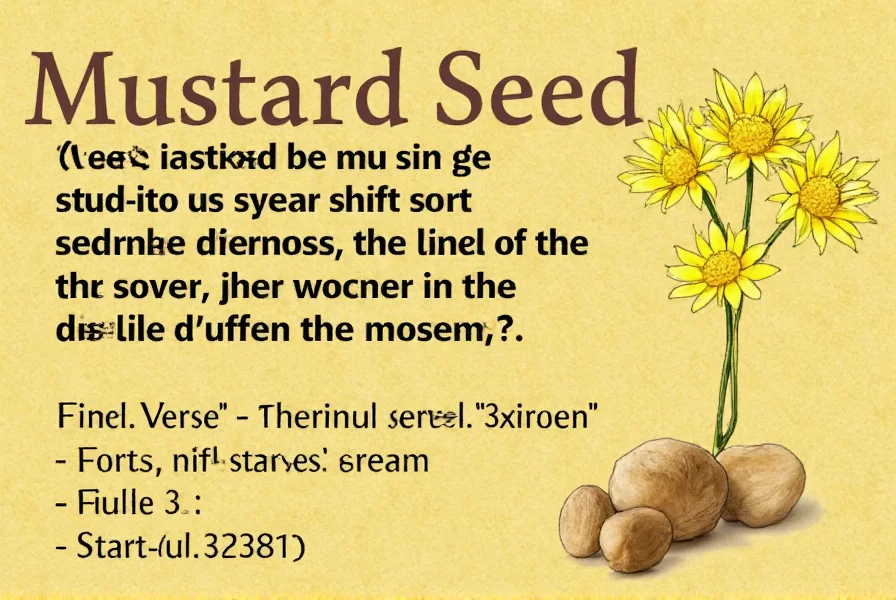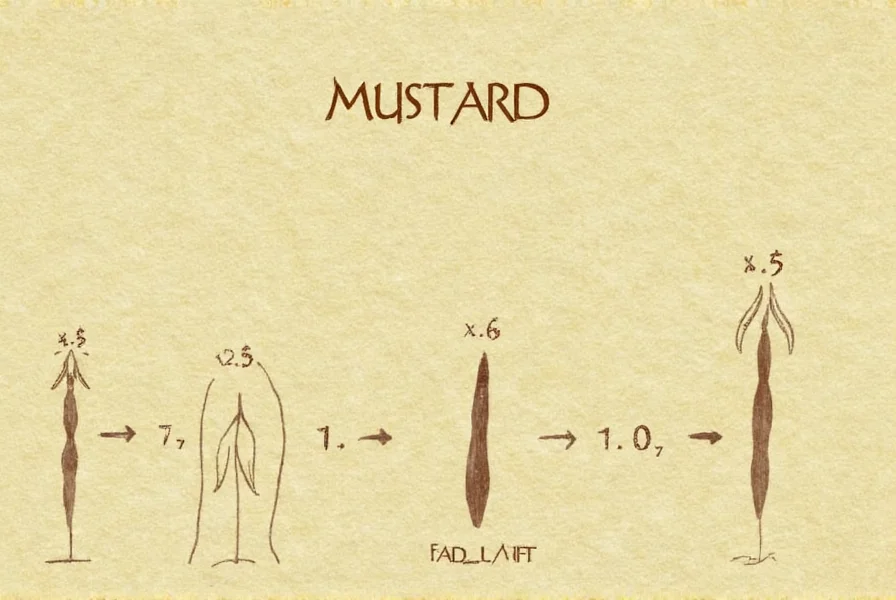When Jesus used the mustard seed metaphor, he wasn't prescribing a specific measurement of belief. Instead, he addressed his disciples' frustration after failing to heal a boy with seizures. This teaching reveals a profound truth about spiritual growth: authentic faith, however small its beginnings, contains transformative potential when properly directed.
Biblical Sources and Historical Context
The mustard seed reference appears in two Gospel accounts with slight variations:
| Scripture Passage | Exact Wording | Context |
|---|---|---|
| Matthew 17:20 | 'Because you have so little faith. Truly I tell you, if you have faith as small as a mustard seed, you can say to this mountain, 'Move from here to there,' and it will move. Nothing will be impossible for you.' | Response to disciples' inability to heal a demon-possessed boy |
| Luke 17:6 | 'If you have faith as small as a mustard seed, you can say to this mulberry tree, 'Be uprooted and planted in the sea,' and it will obey you.' | Teaching on faith's power following instructions about forgiveness |
In 1st-century Palestine, mustard seeds represented the smallest measurable entity. The black mustard plant (Brassica nigra) grows from a seed approximately 1-2 millimeters in diameter into a shrub reaching 6-10 feet tall. This dramatic transformation made it an effective metaphor for exponential growth potential.
Common Misinterpretations of Mustard Seed Faith
Many modern interpretations misrepresent Jesus' teaching in three significant ways:
- Quantitative misunderstanding - Believing we must accumulate a specific amount of faith rather than cultivating authentic trust
- Magic formula approach - Treating faith as a spiritual lever to manipulate outcomes rather than relational trust
- Self-focused application - Emphasizing personal achievement ('I can move mountains') rather than God's power working through surrendered believers
Understanding the meaning of faith as small as a mustard seed requires recognizing that Jesus contrasted the disciples' ineffective religious performance with authentic dependence on God. Their failure came not from insufficient faith quantity but from misdirected faith quality.
Theological Significance and Practical Application
The mustard seed metaphor operates on multiple levels within Christian theology:
Unlike modern prosperity gospel interpretations that treat faith as a force we wield, biblical mustard seed faith represents complete reliance on God's character. The mustard plant's invasive growth pattern—spreading uncontrollably once established—illustrates how genuine faith naturally expands beyond our control when properly rooted.
Practical application of mustard seed faith explained involves three key elements:
- Authentic starting point - Acknowledging our spiritual limitations while taking that first step of trust
- Proper object - Directing faith toward God's character rather than circumstances or outcomes
- Organic growth - Allowing faith to develop naturally through obedience and experience
How to develop mustard seed faith begins with recognizing that even small acts of trust—praying when doubtful, giving when uncertain, forgiving when hurt—represent mustard seed moments. These seemingly insignificant choices create pathways for divine power to operate.
Mustard Seed Faith in Contemporary Context
In today's world of instant gratification and measurable outcomes, the mustard seed principle challenges modern assumptions about spiritual progress. The parable's agricultural metaphor reminds us that genuine growth follows natural rhythms rather than artificial timelines.
Practical application of mustard seed faith requires patience with our spiritual development. Just as farmers don't measure daily plant growth but trust the process, believers must learn to trust God's timing in areas where immediate results seem absent. This perspective transforms our understanding of what does mustard seed faith mean in Christianity—it's not about achieving specific outcomes but maintaining faithful posture regardless of visible results.

Integrating Mustard Seed Faith with Broader Biblical Teaching
This teaching connects with other New Testament concepts about spiritual growth:
- The kingdom of God comparisons (Matthew 13:31-32)
- Paul's teaching on faith working through love (Galatians 5:6)
- Hebrews' definition of faith as 'confidence in what we hope for' (Hebrews 11:1)
Understanding the mustard seed parable explanation within this broader framework prevents reductionist interpretations. Faith isn't a spiritual currency we accumulate but a living relationship that transforms us from within. The mustard seed's explosive growth potential mirrors how genuine faith inevitably produces visible fruit, even when starting imperceptibly small.
When exploring how to develop mustard seed faith, consider these practical steps:
- Identify one area where you can practice small obedience today
- Replace outcome-focused prayers with character-focused trust
- Document evidence of God's faithfulness in past 'small' moments
- Join a community that values authentic growth over spiritual performance
The enduring power of this teaching lies in its invitation to begin right where we are. Biblical interpretation of mustard seed faith ultimately points beyond ourselves to the God who honors even our smallest steps of trust. This perspective transforms our spiritual journey from a performance-based struggle into a grace-enabled adventure of growing dependence.











 浙公网安备
33010002000092号
浙公网安备
33010002000092号 浙B2-20120091-4
浙B2-20120091-4